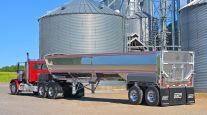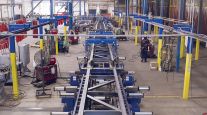Special to Transport Topics
Trailer Manufacturers, Suppliers Aim to Help Fleets Curb Fuel Costs

[Stay on top of transportation news: Get TTNews in your inbox.]
As diesel fuel costs continue to rise, fleets and shippers are thinking of innovative ways to reduce fuel consumption.
Both have found that monitoring trailer performance plays an important role in achieving optimal fuel savings. Industry providers have found ways to increase the performance of trailers while decreasing the fuel consumption of fleets and shippers.
From aerodynamic tails affixed to the back door of the trailer, to sensors monitoring the temperature of the ABS, the trucking and trailer industries are racing to implement cost-saving measures, particularly in the area of fuel consumption.

Fuel consumption and safety have been the focus of many trucking companies since the rise of diesel prices this year. (Stoughton Trailers)
This activity is taking place against the backdrop of diesel fuel prices rising a combined 46.3 cents the weeks of May 2 and May 9, to set a new record at $5.623 per gallon, according to Energy Information Administration data released in May.
There is a sense of urgency in the industry, according to Mike Roeth, executive director of the North American Council for Freight Efficiency (NACFE).
He added that fleets are still trying to figure out the best ways to save fuel and most are buying skirts and tails and vented mud flaps called “flyswatters.”
“Tire inflation of trailer tires accounts for 70-80% of savings,” Roeth said. “Fleets using rolling-resistant tires are going with dual tires and not wide base. Drivers are not paying attention to the trailer. There’s a new generation of rear trailer devices on the market.”
He said a second generation of products — like a booster tail, rocket tail and skirt affixed across the back of the trailer — are making their way to the market.
“We don’t see them as much, but they are practical and work well,” Roeth said. “Today there are more back-of-the-trailer devices coming to market.”
One of those new back-of-the-trailer devices, the Booster-Tail from AeroVolution, was tested at Mesilla Valley Transportation Solutions in Pecos, Texas, in February.

The Booster-Tail from AeroVolution was tested at Mesilla Valley Transportation Solutions in Pecos, Texas, in February. (AeroVolution)
The results of the MVTS certified fuel economy test resulted in a savings of 5.04 gallons per 1,000 miles, a 4.18% reduction in fuel consumption. The Las Cruces, New Mexico-based carrier is ranked No. 78 on the Transport Topics Top 100 list of the largest for-hire carriers in North America.
AeroVolution president and lead designer Lee Telnack said fleets are looking for lightweighting solutions to aerodynamics in addition to simplicity and less maintenance. The self-deploying dynamic device has the same material as a skirt and consists of a fiber reinforced polypropylene panel with reinforced webbing — adding 75 pounds of weight to the rear of the trailer. Aero devices on trailers are typically ordered by fleets when they purchase trailers from the manufacturer.
Daryl Bear, lead engineer and chief operating officer at Mesilla Valley Transport, said these types of tests prove that rear-of-the-trailer kits on the back of the trailer work on dry vans with savings of 4 to 5 gallons per 1,000 miles. He added that those results become significant when extrapolated over 100,000 miles per year on a single tractor — resulting in a measurable reduction in a fleet’s operating cost.
David Giesen, vice president of sales for Stoughton Trailers, said that rising fuel prices are impacting all facets of the trucking industry as fleets look for ways to save costs

Giesen
“Fleets can pass on the costs through fuel surcharges,” he said, “but everybody still wants to reduce fuel consumption.” The Stoughton, Wis.-based trailer manufacturer installs products made for fuel economy when requested at order; but Giesen noted many of the products could be installed by the customer.
Chicago-based trailer manufacturer Great Dane announced last August that its base telematics platform, FleetPulse, would be standard on its new dry and refrigerated trailers.
“Our perspective is that the fleets embrace technology,” said Rob Ulsh, Great Dane’s vice president for dealer and international sales. “They can pick and choose aero devices, whether its skirts, tire inflation sensors or telematics. They are looking for the niche of what works for them.”
Ulsh said telematics is a big factor in cost savings and is the key to fleet communications.
“As tech gets to the point where truck and trailer communicate with each other, that will lead to fuel savings,” he said. “The more we educate customers about telematics and its benefits, the more it will be embraced by customers.”

Mullen
Drov Technologies is a startup that formerly focused on tire-pressure sensors for trailers but spent the last few years building out a comprehensive telematics platform for trailers called AirBox One.
“As the industry relates to trailers, there’s not a lot of visibility on trailer telematics that does not have tire pressure inflation in its footprint,” said Lisa Mullen, the company’s CEO. “We took the tire management piece and expanded it to issues like weight on the axles, temperatures at ABS, were the doors closed, and started with our biggest customers.”
NACFE’s Roeth says the industry is doing better in its efforts to become sustainable. He noted that the days of freight brokering based on time and weight may be in the past.
Want more news? Listen to today's daily briefing above or go here for more info
“Fleets are responding to shippers who are asking ‘How are you moving freight?’ Some tractor specs equal 5% less fuel consumption than before. It’s not only a cost savings but it’s also a strategy,” he said, adding the difference shipping with a fleet that has an average 6 mpg versus 8 mpg is significant.
Bear said sustainability is a topical subject especially when aiming to reduce fuel consumption.
“More customers are asking about sustainability to reduce greenhouse gases,” he said. “People are paying more attention to it and that’s a good thing.”




